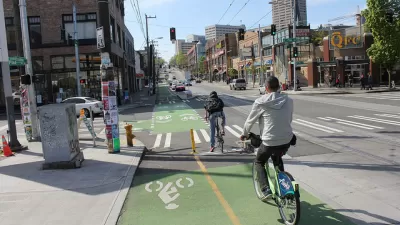Resolution 31515, which officially approved the Bicycle Master Plan, is called a “transformational new way of thinking about bicycle projects within Seattle.” Time, and funding, will tell if the plan lives up to its promise.
“The Seattle City Council has unanimously agreed to overhaul its Bicycle Master Plan, to provide separated bike lanes as well as a network of calm back-street routes known as greenways,” reports Mike Linblom. Seattle adopted its previous Bicycle Master Plan in 2007.
“The plan, approved Monday, calls for 474 miles of new or improved bike routes, at a cost of about $20 million a year for 20 years. Half would be greenways, plus 102 miles of bike lanes separated from traffic, and 32 miles of off-street trails.”
A separate article by Tom Fucoloro provides additional details about the two-year process of drafting the plan and what it will take to build out the planned network.
“The resolution approving the bike plan does not include funding. Cost estimates put the plan somewhere between $391 – $524 million over 20 years, though not all of that money will come directly from Seattle. Regional, state and federal grants will certainly be used to offset much of the cost, and the city can save money by including bike upgrades with other city work (utilities work, major repaving projects, private development, etc),” according to Fucoloro.
FULL STORY: Revamped bike plan to have separated lanes, back-street routes

Planetizen Federal Action Tracker
A weekly monitor of how Trump’s orders and actions are impacting planners and planning in America.

Congressman Proposes Bill to Rename DC Metro “Trump Train”
The Make Autorail Great Again Act would withhold federal funding to the system until the Washington Metropolitan Area Transit Authority (WMATA), rebrands as the Washington Metropolitan Authority for Greater Access (WMAGA).

The Simple Legislative Tool Transforming Vacant Downtowns
In California, Michigan and Georgia, an easy win is bringing dollars — and delight — back to city centers.

The States Losing Rural Delivery Rooms at an Alarming Pace
In some states, as few as 9% of rural hospitals still deliver babies. As a result, rising pre-term births, no adequate pre-term care and harrowing close calls are a growing reality.

The Small South Asian Republic Going all in on EVs
Thanks to one simple policy change less than five years ago, 65% of new cars in this Himalayan country are now electric.

DC Backpedals on Bike Lane Protection, Swaps Barriers for Paint
Citing aesthetic concerns, the city is removing the concrete barriers and flexposts that once separated Arizona Avenue cyclists from motor vehicles.
Urban Design for Planners 1: Software Tools
This six-course series explores essential urban design concepts using open source software and equips planners with the tools they need to participate fully in the urban design process.
Planning for Universal Design
Learn the tools for implementing Universal Design in planning regulations.
Smith Gee Studio
City of Charlotte
City of Camden Redevelopment Agency
City of Astoria
Transportation Research & Education Center (TREC) at Portland State University
US High Speed Rail Association
City of Camden Redevelopment Agency
Municipality of Princeton (NJ)



























